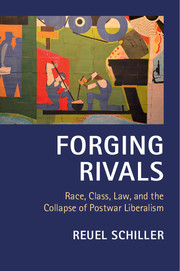Crossref Citations
This Book has been
cited by the following publications. This list is generated based on data provided by Crossref.
Cohen, Jean
2018.
Populism and the Politics of Resentment.
SSRN Electronic Journal,
Brantley, Allyson P.
2019.
“Shouldn’t You Be Boycotting Coors?”.
Radical History Review,
Vol. 2019,
Issue. 134,
p.
142.
Greenspan, Rosann
Aviram, Hadar
and
Simon, Jonathan
2019.
The Legal Process and the Promise of Justice.
Herbert, William A.
2019.
Janus v AFSCME, Council 31: Judges Will Haunt You in the Second Gilded Age.
Relations industrielles / Industrial Relations,
Vol. 74,
Issue. 1,
p.
162.
Cohen, Jean L.
2019.
Populism and the Politics of Resentment.
Jus Cogens,
Vol. 1,
Issue. 1,
p.
5.
Weinrib, Laura
2019.
AGAINST INTOLERANCE: THE RED SCARE ROOTS OF LEGAL LIBERALISM.
The Journal of the Gilded Age and Progressive Era,
Vol. 18,
Issue. 1,
p.
7.
Frymer, Paul
2019.
The Legal Process and the Promise of Justice.
p.
215.
Staszak, Sarah
2020.
Privatizing Employment Law: The Expansion of Mandatory Arbitration in the Workplace.
Studies in American Political Development,
Vol. 34,
Issue. 2,
p.
239.
Steinfeld, Robert J.
2021.
'To Save the People from Themselves'.
2022.
The Cambridge Handbook of Labor and Democracy.
p.
161.
Frymer, Paul
Grumbach, Jacob M.
and
Ogorzalek, Thomas
2022.
The Cambridge Handbook of Labor and Democracy.
p.
180.
Lebow, David
2023.
The value form and the wounds of neoliberalism.
Constellations,
Milkis, Sidney
and
Rader, Katherine
2024.
The March on Washington Movement, the Fair Employment Practices Committee, and the Long Quest for Racial Justice.
Studies in American Political Development,
Vol. 38,
Issue. 1,
p.
16.
Coleman, Sam
2024.
An Ineffectual Sermon: Matthew Desmond’s
Poverty, by America
An Ineffectual Sermon: Matthew Desmond’s
Poverty, by America
, by Matthew Desmond, Penguin Random House LLC, 2023, 381 pp., Hardcover, $28.00, ISBN 9780593239919, Paperback in Large Print, $30.00, ISBN 978-0-593-67854-1,[Page numbers for direct quotations appear in the Large Print edition.]
.
Journal of Progressive Human Services,
p.
1.
Adler, Libby
Dinner, Deborah
Rittich, Kerry
Štýbnarová, Nicole
Thomas, Chantal
and
Zhang, Yiran
2024.
Gender and Political Economy: Revisiting Distributive Analysis.
Signs: Journal of Women in Culture and Society,
Vol. 49,
Issue. 4,
p.
701.



